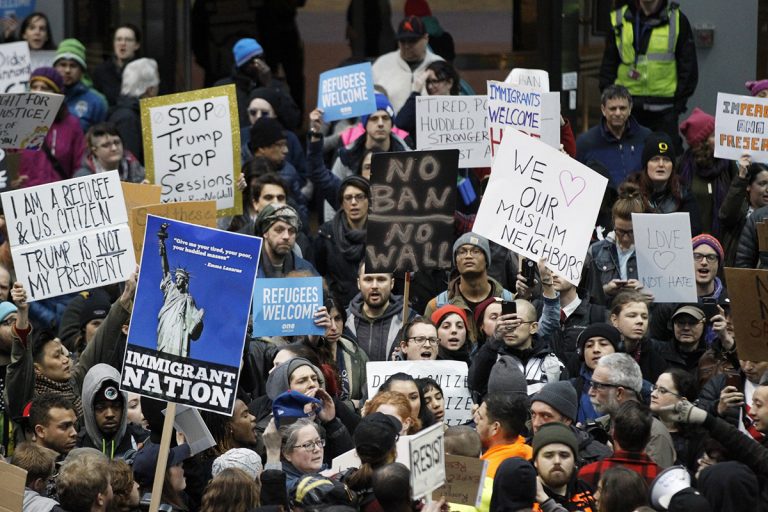
Over the weekend, U.S. President Donald Trump’s so-called “Muslim ban” has affected thousands of foreign students and academics from the Muslim-majority countries included in the ban.
Those from Syria, Iran, Sudan, Libya, Somalia, Yemen, and Iraq who are attempting to re-enter the country after the Executive Order (EO) was signed are being held in detention at airports across the country, despite possessing legal documents such as study/work visas, green cards, or dual citizenship.
The EO denies entry to refugees for the next 120 days and citizens of the seven nations for 90 days.
American universities are warning students who are still in the U.S. to speak to a lawyer before travelling anywhere outside the country, with many advising against unnecessary travel as they may not be allowed back into the country.
This will prevent students from visiting their families, as many often do over semester break or long holidays.
Colleges are warning thousands of Muslim international students not to travel https://t.co/2VacrrdfF7 pic.twitter.com/W32JvEsxrx
— BuzzFeed (@BuzzFeed) January 28, 2017
Princeton University has “strongly advised” students from the countries affected to delay any international travel, while Tulane University in New Orleans has urged foreign students from the countries covered by the ban to carry identification with them at all times, as well as a brochure on civil rights from the American Civil Liberties Union (ACLU).
In a university-wide email, Stanford University’s top administrators have shared the story of a graduate student from Sudan, who despite being a legal permanent resident of the United States, was “briefly handcuffed” and detained for hours at an airport before being released.
“An unfortunate consequence of the new policy appears to be that students and scholars from designated countries are, for the moment, effectively detainees in this country,” said the email, as reported by Buzzfeed.
https://twitter.com/USATODAYcollege/status/825784025163849728
Meanwhile, the University of Michigan has issued a statement saying that it will not share students’ immigration status.
“The university maintains a strong commitment to the privacy of student records for all students, consistent with state and federal laws. We do not provide information on immigration status to anyone except when required by law,” it said.
Students are not the only ones affected: Iranian scholar Fatemeh Shams, an assistant professor in modern Persian literature at the University of Pennsylvania, shared on Facebook that the ban put her career at risk.
“It doesn’t matter if you are a professor at one of the best universities of this country or a student or a migrant or a refugee. As long as you were born in Iran you are accused of being a terrorist and therefore you are banned from living a normal life.
“You are banned from seeing your loved ones. You are banned from travelling (as an academic it is crucial for you to attend conferences. This ban means that I won’t be able to attend any academic conference outside U.S). You are banned from being a human being. YOU ARE IN EXILE. That’s what this executive order means. It’s an insult on humanity,” she wrote.
https://www.facebook.com/TheOther98/photos/a.115969958413991.17486.114517875225866/1674514775892827/?type=3
On Saturday night, a U.S. federal judge ordered a stay on deportation after the ACLU challenged the order on behalf of two Iraqi men who had valid visas to enter the country.
The men had been detained at John F. Kennedy International Airport in New York.
On Sunday, Trump responded to criticism of the temporary ban, saying: “This is not a Muslim ban, as the media is falsely reporting. This is not about religion – this is about terror and keeping our country safe.”
He had called the “extreme vetting” plan necessary to prevent “radical Islamic terrorists” from entering the country.
However, media outlets have pointed out that the ban does not apply to the nationalities of those who carried out the 9/11 terror attacks, such as Saudi Arabia, the United Arab Emirates, and Egypt.
Some even noted that the ban excludes Muslim-majority countries which have a Trump hotel, building, or office.
Tens of thousands have gathered at major cities and international airports across the U.S. since the EO has been enforced to denounce the ban, with chants welcoming refugees and immigrants.
Liked this? Then you’ll love these…
Trump more of a turn-off to international students than Brexit – study







